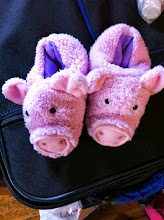I like my pancreas(es)-both my old, worn out, c-peptide dead one and my spanky nice, (relatively) new, blue one. Both of them serve their respective roles.(one for the digestive enzymes, one for the insulin)
What I don't like, is a night in which both of them flunk out.
10 PM- Dex has me at 78, and its been going on for the better part of 1.5 hours,flirting with the 70-80 range.(meter confirms this) I'm feeling low, so I swig some glucose + figure I'll recheck in about an hour. Regretfully, I haven't yet reconnected to my pump + I fall asleep...
3 PM- Shrieking Dex wakes me up,telling me I'm low. NOT in this lifetime, not unless I've spontaneously regenerated islet cells overnight. But I'd better check anyway.
Ultra: 406.(should have put my pump back on last night)I shoot 4 units, resume slumber. Since the Dex is so screwed up, put it somewhere else to chill out those whacky readings.
5:30 PM- Very, very, high. I can tell this, without consulting the meter. Meter confirms, at over 500 mg/dl. I think I must have shot air, not insulin, that first time... Shoot 6 more units.(this isn't the time to be worrying about set reliability)
400
300
200
I start to dream, intense dreams(does the body do that, the more worn out one is?)
I'm low in those dreams and someone is pouring OJ down my throat.(I hate oj, so this is a nightmare) I recover, enter a surfing competition and win first place.(I've never surfed in my life)
A long time(in dream hours) later..
Wake up, 186. Perhaps the title of this post should have been, A Night With(out) the
Pancreas. I am impressed, though, that my correction factor was still so strong even as high as I was, even with no basal.(1/60)In the future, I'm going to program a temp basal NOT take my pump off, going slightly low is much better then waking up 500's and feeling like you've been 10 rounds with Mohammad Ali.It's beyond a yucky feeling,its pure exhaustion.(you just want to curl up and sleep for 12+ hours)
Subscribe to:
Post Comments (Atom)





5 comments:
Heidi - Oh, I hate those nights. And those dreams that come with them. Ahhh!
But congrats on winning that imaginary surfing competition! LOL!
Oh man - rough nite. Major suckage.
From Toni, as promised (slightly off topic; will post in other section, as well). Please look up this organization for more research on GI problems. Lots of Gastro motility disorders and there is a lot to learn so as to help your GI doc diagnose you... i.e. you may have to diagnose yourself! Good luck.
AGMD Online Community
Association of Gastrointestinal Motility Disorders,. Inc or AGMD
Visit our online community at
"AGMD Online Community" (google above in quotes, link did not come in).
AGMD has teamed up with ClinicaHealth to create a free, unique online community service for digestive motility patients, their families, and caregivers.
It is a place where people can find and support one another, share stories, and build a network of online friends.
The Association of Gastrointestinal Motility Disorders, Inc. (AGMD), is one of the oldest non-profit organizations in existence with a focus on digestive motility diseases and disorders. The organization is most unique in that it is an international non-profit organization which brings together patients, family members, physicians, nurses, basic science and clinical researchers, pharmaceutical and diagnostic corporate representatives, home healthcare professionals, nutritionists, biotech industrialists, other organizations, and those in the community interested in digestive motility diseases and disorders through a variety of resources and programs. It is an organization which focuses on education, the dissemination of information, advocacy, outreach, research, and support.
AGMD was also one of the first non-profit organizations to hold a symposium on digestive motility disorders with a distinguished panel of experts speaking and an audience consisting of patients, relatives, friends, and members of the medical and scientific communities. This milestone event took place in 1997. Many organizations have followed this pattern finding it a great way to bring voice to those interested in digestive motility.
In July 2005, AGMD held another Digestive Motility Symposium using the same format which provided an opportunity for the audience to learn about motility and to ask questions to the panel of speakers. The organization worked with the University of Kansas Medical Center of Continuing Education in order to provide CME and CNE accreditation to the program. We held our July 27-29, 2007 AGMD Digestive Motility Symposium at the Boston Burlington Marriott Hotel in Burlington, Massachusetts following the same program format. Our symposium received the prestigious endorsement of both the American College of Gastroenterology and the American Neurogastroenterology and Motility Society (ANMS). CME and CNE accreditation was also provided through the University of Kansas Medical Center of Continuing Education. The program was another great success! We were inspired by all the presenters and look forward to our next symposium. Keep watching our website for updates.
AGMD is also unique in that it was started by a long-time patient who after many years of misdiagnosis, was finally found to have Chronic Idiopathic Intestinal Pseudo-Obstruction (CIIP). Over the years, her disease progressed to include her entire digestive tract which has left her with gastroparesis, diffuse esophageal spasm, achalasia, gastroesophageal reflux disease, esophagitis, and a myriad of other diseases and medical conditions affecting her neurological, muscular, circulatory, skeletal, and endocrine systems.
As a result of her journey with disease she has been able to dedicate her life to AGMD and her quest in finding answers, providing assistance, disseminating education, creating a support system, advocating for research, and bringing together medical professionals with patients in order to gain a better understanding of this specialized area of gastroenterology.
That stinks ... 2 dysfunctional pancreases at the same time! Like anything, I'm sure it will change as soon as you think you've got it all figured out!
Wow, Heidi. Nothing works like a 500+ BS to make you feel as if you've been run over by a locomotive.
I agree that doing a temp basal would be a better plan next time.
Post a Comment